As we prepare to celebrate Christmas, it is right to spare a thought for Bethlehem and its inhabitants and pray for peace in 2007 and beyond.
The so called "peace wall" in and around Bethlehem has reduced the district to its urban core. It severs the built-up areas from thousands of acres of agricultural land and water resources. There are 27 Israeli settlements in the Bethlehem district built on land confiscated from Bethlehem’s private owners. It is predicted that once the wall is complete Bethlehem will lose 70% of its territory altogether.
A system of cement walls, electric fences, settlers only roads and checkpoints creates a prison-like environment for the people of Bethlehem. The World Bank cites the closure regime as the direct cause of the humanitarian crisis.
70% of the population in Bethlehem lives below the poverty line. Unemployment is higher than 60%. Tourism, which accounts for 65% of the Bethlehem economy is now almost entirely controlled by Israeli companies, meaning that the few tourists that come to Bethlehem don’t stay for more than a few hours. The Hotel Association in Bethlehem has reported that only 2.5% of rooms were booked in 2005 in comparison to 22.1% in 2000.
The Christian population in Bethlehem accounts for 41.3% of the population in Bethlehem town proper and 26% in the whole district. Following Israeli invasions in 2001-2002, Bethlehem lost 10% of it Christian population as 3000 Christians left the city. UNOCHA report, December 2004: http://www.reliefweb.int/library/documents/2004/ocha-opt-20dec.pdf
The emigration of Christians is a serious threat to Palestine’s mixed heritage which embraced diversity for centuries.
The Jerusalem-Bethlehem dioceses of the Latin (Catholic), Anglican and Armenian Churches – in common with the Eastern Orthodox and Syriac Orthodox Churches – is centred on the various cathedrals of Jerusalem. The Israeli wall cuts these ancient diocese into parcels, separating churchmen from their congregations and families from each other.
The short road between Bethlehem and Jerusalem has always been the great high road of the Christian faith, linking as it does the cities of Our Lord’s birth and resurrection. It has been trodden by countless millions of pilgrims in the last 2,000 years. We are dismayed that the road between Bethlehem and Jerusalem is now closed to the great majority of Palestinians, Christian and Muslim, and passable only with much inconvenience and expenditure of time by pilgrims visiting the Holy Land. We view this closure and the barrier being built around Bethlehem as a grave injustice to its people, a serious threat to its economic life and social fabric, and an affront to all Christians.
Wednesday, December 13, 2006
Subscribe to:
Post Comments (Atom)




No comments:
Post a Comment